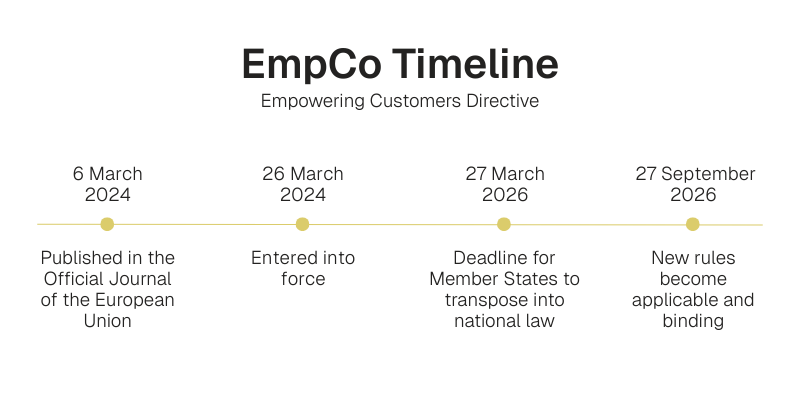Empowering Consumers Directive (EmpCo)
What is the EU’s Empowering Consumers Directive?
The EmpCo directive, short for the Directive on Empowering Consumers for the Green Transition (EU 2024/825), is an EU directive that aims to protect consumers from misleading environmental claims and labels.
The directive forms part of the European Green Deal while amending the existing Unfair Commercial Practices Directive (UCPD or Directive 2005/29/EC) and the Consumer Rights Directive (CRD).
Beginning in September 2026, EmpCo will go into effect for companies operating in the EU.
Main features of the EmpCo
The main reasons for why the EU created the rules were to stop unfair practices, protect against vague future-tense claims, and ensure that environmental claims—particularly those about future performance—are backed by verifiable, science-based commitments and independently verified. While the directive contains rules for different types of product claims, environmental, social, and circularity claims are the main features.
Environmental claims and labels
The following principles outline what to consider when using claims or labels:
- Future-oriented claims (e.g. "climate neutral by 2030") require a credible implementation plan
- Generic terms like "eco-friendly" or "green" can only be used if substantiated and verifiable
- Labels and seals must be independent, transparent, and traceable
- Offset-based claims can’t be used if they rely on offsets outside the value chain
EmpCo timeline
- 6 March 2024: Published in the Official Journal of the European Union
- 26 March 2024: Entered into force
- 27 March 2026: Deadline for Member States to transpose into national law
- 27 September 2026: New rules become applicable and binding for all companies operating in the EU
- 27 September 2031: European Commission review report due

EmpCo Directive vs. Green Claims Directive
While the Green Claims Directive focuses on scientific substantiation and third-party verification, EmpCo targets B2C communication and strengthens consumer protection. Both directives are part of the European Green Deal and cover similar environmental claims, so the Green Claims would have been lex specialis compared to EmpCo, if it were to be adopted.
EmpCo: What businesses need to know
In short, companies wanting to use an environmental claim need to prove it. While the definition of an "environmental claim" is broad, here’s a basic checklist of dos and don’ts for compliance:
- Do: Map claims to evidence, publish target plans, and provide third-party verification for any future-tense claims.
- Do: Audit labels; keep only credible or certified schemes.
- Don’t: Use vague green terms without top-tier, recognised performance.
- Don’t: Market offset-based products; focus claims on actual lifecycle impacts.
ClimatePartner certified
With 20 years of climate action communication experience, ClimatePartner introduced the ClimatePartner certified label in 2023 to make credible, science-backed claims for a company’s products and services.
After calculating the carbon footprint of a product or company, ClimatePartner helps companies create science-based reduction targets and a portfolio of climate projects to support. Then ClimatePartner provides climate action communication support so that companies can make claims compliant and representative of the positive impact they’re having on the climate.
Are your claims up to date? Get in touch with us today to find out!